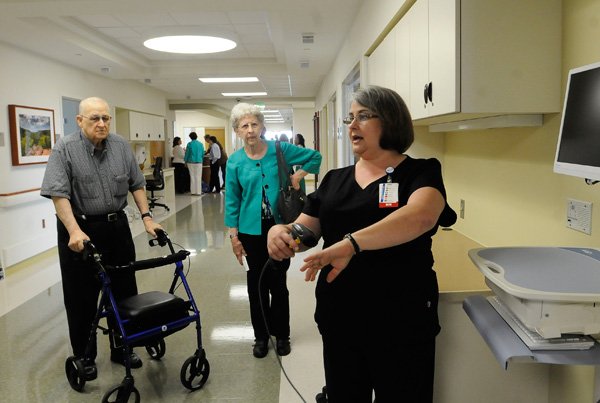ROGERS — A new Senior Behavioral Health Program opens Monday on the seventh floor of Mercy Medical Center.
The $3.5 million project is geared to helping patients 55 and older with psychiatric issues interfering with their lives or making them a danger to themselves or others. Patients also will have full access to medical care.
“Hopefully we are building a legacy,” Dr. Donnie Holden, the program’s medical director, said to more than 100 people gathered along the center’s hallway Tuesday to celebrate its opening.
The Walmart Foundation donated $1 million for the senior program earlier this year.
At A Glance
The Program
Mercy’s Senior Behavioral Health Program is an 18-bed unit serving a growing geriatric population with hospital-based care. It is geared to patients 55 and older with disorders disrupting their lives or who may be at risk of hurting themselves or others.
Areas of treatment:
• Severe depression, anxiety
• Suicidal thoughts
• Unresolved grief issues
• Changes in eating and sleeping patterns
• Anger, irritability
• Paranoia, hallucinations, delusions, crying
• Agitation, combative behavior
• Behavioral disturbances accompanying dementia and Alzheimer’s Disease
• Disorientation
Source: Mercy Medical Center
The facility will start with between five and 10 beds but will eventually accommodate 18 patients, he said.
Holden said the program will help fill the area’s need for such services. It marks the fourth inpatient psychiatric center in Benton and Washington counties and is the third to cater to the senior population.
Springwoods Behavioral Health and Vista Health, both in Fayetteville, have beds dedicated to aging populations. Calls to both centers were not returned Tuesday.
“They turn away 34 patient inquiries a week,” Holden said.
The need for senior beds will continue to rise with Northwest Arkansas’ growing and aging population, Holden said.
“With great growth comes great change,” he said.
The U.S. Census Bureau reports the area’s population grew by more than 8,000 people, or about a 2 percent increase, between July 1, 2011, and July 1, 2012.
The Administration on Aging reports America also is getting older. The group reports people 65 and older represented 12.4 percent of the U.S. population in 2000 and anticipates it will grow to 19 percent by 2030.
Dr. Michael Hollomon, medical director for the University of Arkansas for Medical Sciences Psychiatric Research Institute-Northwest, runs a 28-bed center at Northwest Medical Center-Springdale. He said his program primarily serves a younger population.
“I like the idea of opening up some beds in Benton County,” he said. “It will certainly give some options.”
Most patients will stay between seven and 14 days.
Tom Petrizzo, Ozark Guidance chief executive officer, said Mercy’s program will be eligible for more Medicaid payments because it's attached to the hospital. Medicaid only pays for inpatient psychiatric care for people ages 22 to 64 if they are in a general hospital setting.
Springwoods and Vista Health are freestanding centers.
“Being part of the hospital lets Mercy serve more people since they can drop their admission age to 55,” Petrizzo said.
Some issues Mercy medical staff will address in the senior unit include Alzheimer’s, depression, paranoia and disorientation.
Americans age 65 and older account for about 13 percent of the population but commit almost a fifth of all suicides. The National Institute of Mental Health reports the suicide rate for people age 65 and older is 14.3 per 100,000 people compared to the national average of 11.3 per 100,000.
Beth Simpson, program director for Mercy’s new offering, said often a senior patient’s problems can be traced back to a medical issue such as trouble with medication or an infection. Once the problem is identified, a treatment plan is established.
Stephanie Bushnell, recreational therapist, said patients will take part in therapy ranging from physical and mental exercises to arts and crafts.
“Socialization is key. A lot of these patients seem to isolate themselves,” she said.
Most patients will have private rooms. A pair of rooms are doubles.
Simpson said special attention was paid to even the smallest detail of the seventh floor to ensure patients cannot hurt themselves, including high ceilings, safety glass and double doors that cannot be barricaded.
The inpatient senior mental health offering is just part of Mercy’s planned program expansion. Mercy also plans to expand senior behavioral health offering at its Lowell outpatient clinic later this year.

